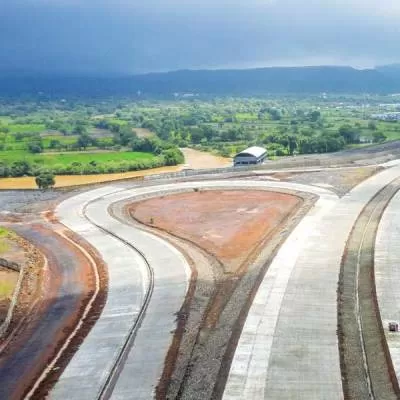- Home
- Real Estate
- Realty at the Centre
Realty at the Centre
The contour of the Real Estate Draft Bill has changed to make it a central legislation - a shift from it being a state matter earlier. Shriyal Sethumadhavan reports...
India continues to grow between 8-9 per cent and has the potential to become the second largest economy by 2039. According to last year's McKinsey Report, by 2030, the economy will have to build between 700 million to 900 million sq m of residential and commercial space every year. While the real estate industry in India is expected to boom, riding on and contributing to a growing economy, it seems to be caught in a web of issues and problems that need urgent addressing. What are the inadequacies? Is it the lack of 'industry' status, unclear and frequently changing regulations, or an amalgamation of these and more?
The concept of a real estate bill has been floating around in the government for almost 10 years now, and a draft bill has been in the making for over two years. Reportedly, a change has been proposed in the contour of the Real Estate Draft Bill – to make it a central legislation from hitherto being a state matter. It is learnt that the revised bill will now concentrate on consumer protection and contractual obligations of developers, and the Ministry of Housing and Urban Poverty Alleviation has sought the approval of the Ministry of Law on the proposed legislation.
As Sunil Kumar Singh, Joint Secretary (Housing), Ministry of Housing & Urban Poverty Alleviation, says, "We have proposed that the revised bill be introduced in the Parliament under the concurrent list of the constitution in order to make it a Central subject." Explaining the procedure, he informs that any bill introduced in the Parliament is normally referred to its standing committee. The committee sources the public view at large through various avenues like the CII, FICCI, ASSOCHAM and so on. This is followed by a debate in the Parliament about the discretion, after which, the final decision is passed.
Implications and reactions
So what happens if the Real Estate Draft Bill is approved by the law ministry and thereafter clears the Cabinet and Parliament scrutiny? Developers will have to make public disclosures related to land title, project completion date and other relevant details on the website of the proposed regulatory authority; that too before launching any project. What's more, they will have to register themselves with the regulatory authority.
"One area of focus is how the consumer can be protected in case there is a delay in the delivery of the project. But, from the developers' point of view, there are so many approvals to be taken that at times, it leads to delays in delivering the project," highlights Anshuman Magazine, Managing Director – South Asia, CB Richard Ellis. "There has to be some balance between consumer protection and developers' interest."
Red tape issues
Whenever a legislation is passed in India, one is skeptical about whether it will actually achieve its purpose. "If you talk to a real estate developer, he will obviously say that it will lead to more red tape," echoes Kruti Kumar Jain, Director, Kumar Urban Development Ltd. "Change is always welcome, provided someone is willing to follow it through; there cannot be isolated solutions." In her words, if each real estate developer is abolutely transparent and declares to each and every consumer (who may not even be a buyer) the permissions, project status and other schemes, imagine the kind of vulnerability a real estate developer might face from a mischief monger!
And while Magazine strongly believes that the consumer needs to be protected, he is quick to point out that despite having a number of legal avenues, the unhidden fact remains that the existing laws are slow to implement. "Still a lot of reform and transparency is required. So, if these are not implemented and another act is introduced, there could be a problem. But, as long as the aim is to protect the consumers and the act is properly structured, it would not lead to red tape," he says.
Single window clearances
At the recent Real Estate & Housing Investment Conclave held by CII in Mumbai, Singh was responding to one of the major concerns of the real estate industry; that of seeking over 50 clearances from different agencies, right from municipal to state to the central government, that often take up to three years, thus delaying a project. Pushing for a single window clearance for real estate projects has been the drive of the Central government, he said.
For her part, Jain is certain that if another table has to be there, it must be in a holistic single window clearance, where one has a check list with several regulations to comply with; one complies with them all at once, and that's it!
The outcome
Despite being the fourth largest economy in the world, India needs to push real estate and housing to keep fuelling this growth to become a global economic super power. As the revised Real Estate (Draft) Bill is primarily targeted towards addressing consumer grievances, the consumer must be confident and trust the business practices in the sector. On both sides, the consumers and developers have genuine reasons to defend themselves. So, while the intentions are noble, the question still remains – will the bill succeed as a redress mechanism for consumer grievances, or will it complicate matters further?
To share your views on the above article write in at feedback@ASAPPmedia.com
- Construction
- Update
- Portal
- Magazine
- CW-India
- June
- 2011
- India
- Real Estate Draft Bill
- McKinsey Report
- economy
- real estate
- government
- Sunil Kumar Singh
- Parliament
- CII
- FICCI
- ASSOCHAM
- Anshuman Magazine
- CB Richard Ellis
- Kruti Kumar Jain
- Kumar Urban Development Ltd
- Real Estate & Housing Investment Conclave
- single window clearance
The contour of the Real Estate Draft Bill has changed to make it a central legislation - a shift from it being a state matter earlier. Shriyal Sethumadhavan reports... India continues to grow between 8-9 per cent and has the potential to become the second largest economy by 2039. According to last year's McKinsey Report, by 2030, the economy will have to build between 700 million to 900 million sq m of residential and commercial space every year. While the real estate industry in India is expected to boom, riding on and contributing to a growing economy, it seems to be caught in a web of issues and problems that need urgent addressing. What are the inadequacies? Is it the lack of 'industry' status, unclear and frequently changing regulations, or an amalgamation of these and more? The concept of a real estate bill has been floating around in the government for almost 10 years now, and a draft bill has been in the making for over two years. Reportedly, a change has been proposed in the contour of the Real Estate Draft Bill – to make it a central legislation from hitherto being a state matter. It is learnt that the revised bill will now concentrate on consumer protection and contractual obligations of developers, and the Ministry of Housing and Urban Poverty Alleviation has sought the approval of the Ministry of Law on the proposed legislation. As Sunil Kumar Singh, Joint Secretary (Housing), Ministry of Housing & Urban Poverty Alleviation, says, We have proposed that the revised bill be introduced in the Parliament under the concurrent list of the constitution in order to make it a Central subject. Explaining the procedure, he informs that any bill introduced in the Parliament is normally referred to its standing committee. The committee sources the public view at large through various avenues like the CII, FICCI, ASSOCHAM and so on. This is followed by a debate in the Parliament about the discretion, after which, the final decision is passed. Implications and reactions So what happens if the Real Estate Draft Bill is approved by the law ministry and thereafter clears the Cabinet and Parliament scrutiny? Developers will have to make public disclosures related to land title, project completion date and other relevant details on the website of the proposed regulatory authority; that too before launching any project. What's more, they will have to register themselves with the regulatory authority. One area of focus is how the consumer can be protected in case there is a delay in the delivery of the project. But, from the developers' point of view, there are so many approvals to be taken that at times, it leads to delays in delivering the project, highlights Anshuman Magazine, Managing Director – South Asia, CB Richard Ellis. There has to be some balance between consumer protection and developers' interest. Red tape issues Whenever a legislation is passed in India, one is skeptical about whether it will actually achieve its purpose. If you talk to a real estate developer, he will obviously say that it will lead to more red tape, echoes Kruti Kumar Jain, Director, Kumar Urban Development Ltd. Change is always welcome, provided someone is willing to follow it through; there cannot be isolated solutions. In her words, if each real estate developer is abolutely transparent and declares to each and every consumer (who may not even be a buyer) the permissions, project status and other schemes, imagine the kind of vulnerability a real estate developer might face from a mischief monger! And while Magazine strongly believes that the consumer needs to be protected, he is quick to point out that despite having a number of legal avenues, the unhidden fact remains that the existing laws are slow to implement. Still a lot of reform and transparency is required. So, if these are not implemented and another act is introduced, there could be a problem. But, as long as the aim is to protect the consumers and the act is properly structured, it would not lead to red tape, he says. Single window clearances At the recent Real Estate & Housing Investment Conclave held by CII in Mumbai, Singh was responding to one of the major concerns of the real estate industry; that of seeking over 50 clearances from different agencies, right from municipal to state to the central government, that often take up to three years, thus delaying a project. Pushing for a single window clearance for real estate projects has been the drive of the Central government, he said. For her part, Jain is certain that if another table has to be there, it must be in a holistic single window clearance, where one has a check list with several regulations to comply with; one complies with them all at once, and that's it! The outcome Despite being the fourth largest economy in the world, India needs to push real estate and housing to keep fuelling this growth to become a global economic super power. As the revised Real Estate (Draft) Bill is primarily targeted towards addressing consumer grievances, the consumer must be confident and trust the business practices in the sector. On both sides, the consumers and developers have genuine reasons to defend themselves. So, while the intentions are noble, the question still remains – will the bill succeed as a redress mechanism for consumer grievances, or will it complicate matters further? To share your views on the above article write in at feedback@ASAPPmedia.com
























